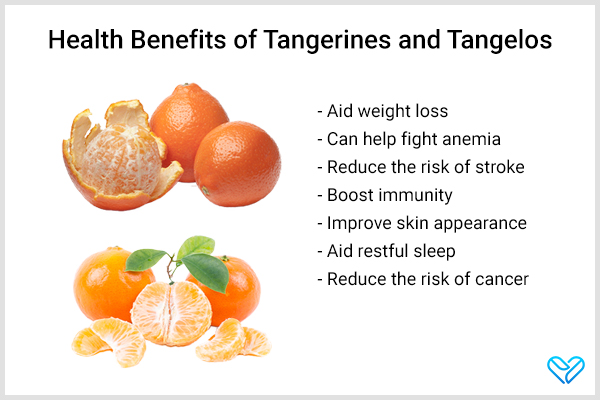In this article:
Tangerines and tangelos are both fruits of the citrus family and look very similar to each other. While tangerines look a lot like clementines (which is a type of citrus fruit that looks like orange), tangelos have a knobby structure at their base, giving them a slightly longer appearance.

Both fruits are largely similar but do have certain differences.
Tangerines are the second most popularly consumed citrus fruit and are a type of mandarin. They are native to Southeast Asia and are rich sources of polyphenols. (1)
Tangelos, on the other hand, are a hybrid fruit made by cross-breeding tangerine with grapefruit or tangerine with pummelo. (2)
Nutrients in Tangerine
Tangerines are a low-calorie, high-in-water fruit. One average-sized tangerine has only 58 calories, provides 7% of the daily value of fiber, and contains 93 g of water.
Tangerines also provide: (3)
- 4% of the daily value of vitamin A
- 32% of the daily value of vitamin C
- 1% of the daily value of iron
- 3% of the daily value of calcium
- 6% of the daily value of copper
Nutrients in Tangelo
Tangelos are similar to tangerines in being a low-calorie fruit with a high water content. One medium-sized fruit provides 47 calories and provides 10% of the daily value of fiber.
Tangelos also provide: (4)
- 4% of the daily value of vitamin A
- 89% of the daily value of vitamin C
- 1% of the daily value of iron
- 4% of the daily value of calcium
Health Benefits of Tangerines and Tangelos

Consuming tangerines and tangelos can offer the following benefits for your health.
1. Aid weight loss
Both tangerines and tangelos are low-calorie fruits. Due to their moderately high fiber and water content, they can effectively help reduce weight. (5)(6)
Not only that, the rich polyphenol compounds present in citrus fruits have been extensively studied for their effect on weight. Results from multiple studies have proven the efficacy of citrus fruits in reducing overall body fat. (7)
Include 1–2 tangerines or tangelos in your daily diet to help with optimum weight management.
2. Can help fight anemia
While tangerines and tangelos do not contain sufficient amounts of iron to fight against iron deficiency anemia, both fruits are rich sources of vitamin C.
Since iron deficiency anemia occurs due to a lack of iron in the blood, which reduces the body’s ability to produce enough hemoglobin, (8) it is not only necessary to eat iron-rich foods but also to eat foods that will increase the absorption of iron in the body.
Vitamin C is one such nutrient that boosts the absorption of iron. (9) Eating a vitamin C-rich fruit along with iron-rich sources such as spinach, dill, and kale can help fight iron deficiency anemia, especially in susceptible groups such as children, young women, and pregnant women.
Since tangelos are richer in vitamin C than tangerines, they can be better foods for increasing iron absorption.
3. Reduce the risk of stroke
A diet high in fruits and vegetables is considered beneficial for heart health in general, but the flavonoids present in citrus fruits, such as naringenin, hesperetin, anthocyanins, and flavones, have been specifically identified in reducing the risk of strokes in women. (10)
Both tangerines and tangelos are rich in these flavonoids and can aid in reducing the overall risk of stroke.
4. Boost immunity
Tangerines and tangelos are great natural immunity boosters. Due to their polyphenol and vitamin C content, they can improve the activity of natural immune-boosting cells, which aid in fighting infections as well as disease-causing microorganisms. (11)
In addition, the vitamin C and hesperidin in both fruits are potent anti-inflammatory agents that help in reducing inflammation-causing substances that can lead to the development of chronic illnesses such as type 2 diabetes. (11)
5. Improve skin appearance
It is no surprise that vitamin C benefits the skin. Not only is it a strong antioxidant, but it also boosts collagen production, which helps in giving the skin a youthful appearance. (12)
Animal studies have also found the flavonoids in tangerines to benefit the symptoms of psoriasis, which is an inflammatory skin condition. (13) However, extensive human trials are needed to replicate results in humans.
You can also use the dried and powdered peels of these fruits as part of face masks or scrubs. Because there is some evidence pointing to a higher polyphenol content in tangerines as compared to tangelos, it is better to use the former for your skin needs. (14)
6. Aid restful sleep
Aromatherapy is considered very beneficial when it comes to improving the quality of sleep. It is as simple as smelling essential oils and inhaling the relaxing scents. (15)
A recent study showed the effect of tangerine essential oil in calming the brain and inducing sleep. (16) Even eating a tangerine will release the essential oils that you can smell. In addition, you can add tangerine peels to a pot of simmering water and inhale its scent.
Since no such study exists for tangelos yet, it can be concluded that tangerines are better at improving sleep.
7. Reduce the risk of cancer
Citrus fruits and the flavonoids found in their peel have been found to have some anticancer activity.
Among these flavonoids, naringenin, naringin, and quercetin have been found to decrease the size of tumors in lab tests. Their use was especially useful in people with breast cancer. (17)
In studies done for thyroid cancer, the flavonoids in tangelo were found to be more effective in reducing cancer risk. (18)
Recommendations

Both tangerines and tangelos have comparable nutrients and health benefits except in a few cases.
If you are looking to fight anemia, boost immunity, and improve skin health, eating tangelos can be more beneficial due to their higher vitamin C content.
For calming the mood and facilitating restful sleep, tangerines win.
How to Use Citrus Peels
Many studies mention the benefits of polyphenols in the peels. Here is a simple and effective way of preparing and using citrus peels:
- Using a peeler, peel the outer layer of the fruit while avoiding the white pith.
- Chop or slice the peels into fine strands and dry them in a shaded, well-ventilated spot.
- You can add this to soups, sauces, gravies, rice dishes, or any meal to add flavor and boost their nutritional value.
Most-Asked Questions About Tangerines and Tangelos
Can people with diabetes eat tangerines and tangelos?
Due to the sweet flavor of these fruits, some people with diabetes may need to avoid eating them to prevent spikes in blood sugar.
However, their high fiber and water content also prevents spikes in blood sugar after eating them. In addition, citrus fruits in general are beneficial in preventing the development of type 2 diabetes. (19)
However, avoid drinking the juices of tangerines and tangelos due to their high concentration of sugar.
What time is best to eat these fruits?
It is generally a good idea to avoid eating citrus fruits on an empty stomach. Consume these fruits after meals or as a mid-meal snack.
Practical Takeaways

- Tangerines and tangelos belong to the larger citrus family of fruits. While tangerines are a type of mandarin, tangelos are a hybrid fruit obtained from mixing tangerine and grapefruit.
- Both fruits contain similar nutrients; however, tangelos have a higher vitamin C content.
- Due to their nutritive profile and rich polyphenol and flavonoid content, both fruits can offer health benefits such as preventing strokes, improving anemia, aiding weight loss, promoting skin health, preventing cancer, and aiding restful sleep.
- Tangelos are better for fighting anemia, boosting immunity, and improving skin health.
- Tangerines have been known to improve sleep due to their essential oil content.
- Since most polyphenols are in citrus peels, preparing and using the peels in the diet can be a great way to consume these polyphenols.
- Was this article helpful?
- YES, THANKS!NOT REALLY


